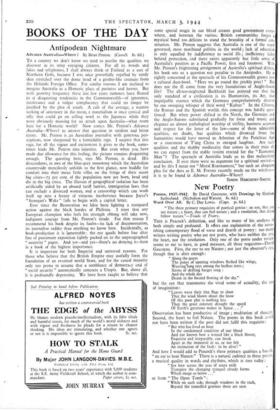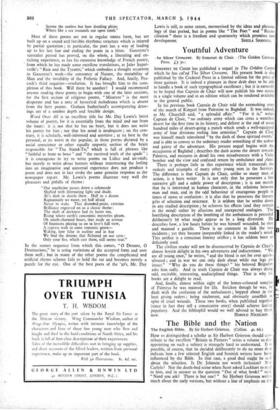New Poetry
Poems, 1937-1942. By David Gascoyne, with Drawings by Graham Sutherland. (Nicholson and Watson. 8s. 6d.) Word Over All. By C. Day Lewis. (Cape. 3s. 6d.)
"The three primary requisites of poetical genius: an eye, that can
see nature ; a heart, that can feel nature ; and a resolution, ;hat darn
follow nature."—Triads of Poetry.
TIM is Peacock's definition, and like so many of his analyses is both simple and profound. It offers one explanation of the aston- ishing contemporary flood of verse and dearth of poetry: too many writers writing poetry who are not poets, who have neither the eye,
the heart, nor the resolution. Only one of the poets under review seems to me to have, in good measure, all three requisites—David
Gascoyne. First, the eye to see Nature ; not just the observer's eye,
though that is alert enough:
" Along the quays
The panes of opening windows flashed like wings, Weaving long rays among the leafless trees ; Sirens of drifting barges sang : And the whole day Drank in the fecund flowing of the sky."
but the eye that transmutes the vivid scene of actuality, the er:
of imagination : " Leaves wave their tiny flags to show That the wind blown about the brow Of this poor plot is nothing less Than the great constant draught the speed Of Earth's gyrations makes in Space . . . '
Observation has been productive of image ; meditation of thou..:nt Second, the heart to feel Nature. The poems in this book could not have been written if the poet did not fulfil this requisite:
" But who has lived an hour In the condemned condition of our blood And not known how a wound like a black flower, Exquisite and irreparable, can break Apart in the immortal in us, or not felt An. intimation of the fault : to be alive! "
And here I would add to Peacock's three primary qualities a fourth.
"an ear to hear Nature." There is a natura; cadence in these poem•
a musical quality in words and rhythms, which is rare today :
" See how across the seas of azure milk
Transpire the changing tranquil cloudy forms Which image us below ..."
or from "The Open Tomb ": " While on each side, through windows in the rock, Beyond the tunnelled grottoes there are seen Serene the sunless but how dazzling plains Where like a sea resounds our open tomb."
Most of these poems are not in regular stanza form, but are built up on a sound and forcible rhythmic structure which is injured by partial quotation ; in particular, the poet has a way of leading up to his last line and ending the poem in a blaze. Gascoyne's surrealist period has proved, on the whole, a liberating and en- riching experience, as has his extensive knowledge of French poetry, from which he has made some excellent translations, as Jules Super- vielle's " Rain and the Tyrants," which embodies a thought recurrent in Gascoyne's work—the constancy of Nature, the mutability of Man and the invalidity of the Pathetic Fallacy. And, finally, Pea- cock's third requisite—resolution. It has brought him to the com- pletion of this book. Will there be another? I would recommend anyone reading these poems to begin with one of the later sections, for the first section of religious poems, " Miserere " is the most desperate and has a note of hysterical melodrama which is absent from the later poems. Graham Sutherland's accompanying draw- ings are of a sombre depth and forcible design.
Word Over All is an excellent title for Mr. Day Lewis's latest volume of poetry, for it is essentially from the mind and not from the heart: it is not that he has no heart, but it does not write his poetry for him ; nor that his mind is inadequate ; on, the con- trary, it is scholarly, well-informed and sensitive ; at its best in the personal, at its worst in the popular, in those poems dictated by a social conscience or other equally unpoetic section of the brain responsible for " The Stand-To," which is full of phrases like " faithful as bone to bone " and " the received truth of the spade " ; it is courageous to try to write poems on Lidice and air-raids, but merely to write about horrors without transmuting the feeling
into an imaginative and universal experience does not produce a poem and does not in fact evoke the same genuine response as the newspaper report. Mr. Lewis's poems illustrate very well the pleasures and pitfalls of rhyme:
" Our youthtime passes down a colonnade Shafted with Alternating light and shade. All's dark or dazzle there. Half in a dream Rapturously we move, yet half afraid Never to wake. That diamond-point, extreme Brilliance engraved on us a classic theme: The shaft of darkness had its lustre too, Rising where earth's concentric mysteries gleam. Oh youth-charmed hours, that made an avenue Of fountains playing us on to love's full view, A cypress walk to some romantic grave— Waking, how false in outline and in hue We find the dreams that flickered on our cave: Only your fire, which cast them, still seems true."
In the sonnet sequence from which this comes, " 0 Dreams, 0 Destinations," he is using variations of the accepted form and uses them well ; but in many of the other poems the complicated and artificial rhyme scheme fails to hold the ear and becomes merely a puzzle for the eye. One of the best poets of the '30's, Mr. Day Lewis is still, to some extent, mesmerised by the ideas and phraseo- logy of that period, but in poems like "The Poet" and "Recon- ciliation " there is a freedom and spontaneity which promises new



























 Previous page
Previous page